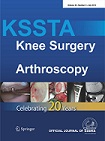
ARTHROPLASTY
Patient-specific vs. conventional instrumentation TKA: similar effect on implant rotation
This report has been verified
by one or more authors of the
original publication.
Knee Surg Sports Traumatol Arthrosc. 2013 Oct;21(10):2213-9
40 patients, between the ages of 50 and 85, who were unresponsive to conservative treatment and were scheduled to receive total knee arthroplasty (TKA), were randomly assigned into 1 of 2 groups to test the effect of patient-specific instrumentation (PSI) on accuracy and rotational alignment in TKA. Patients received treatment with PSI or through a conventional TKA. Results indicated that PSI did not have a significant effect on the rotational alignment in patients following TKA.
Unlock the full ACE Report
You have access to {0} free articles per month.Click below to unlock and view this {1}
Unlock NowCritical appraisals of the latest, high-impact randomized controlled trials and systematic reviews in orthopaedics
Access to OrthoEvidence podcast content, including collaborations with the Journal of Bone and Joint Surgery, interviews with internationally recognized surgeons, and roundtable discussions on orthopaedic news and topics
Subscription to The Pulse, a twice-weekly evidence-based newsletter designed to help you make better clinical decisions
Exclusive access to original content articles, including in-house systematic reviews, and articles on health research methods and hot orthopaedic topics
Or upgrade today and gain access to all OrthoEvidence content for just $1.99 per week.
Already have an account? Log in


Subscribe to "The Pulse"
Evidence-Based Orthopaedics direct to your inbox.
{0} of {1} free articles
Become an OrthoEvidence Premium Member. Expand your perspective with high-quality evidence.
Upgrade Now













































































